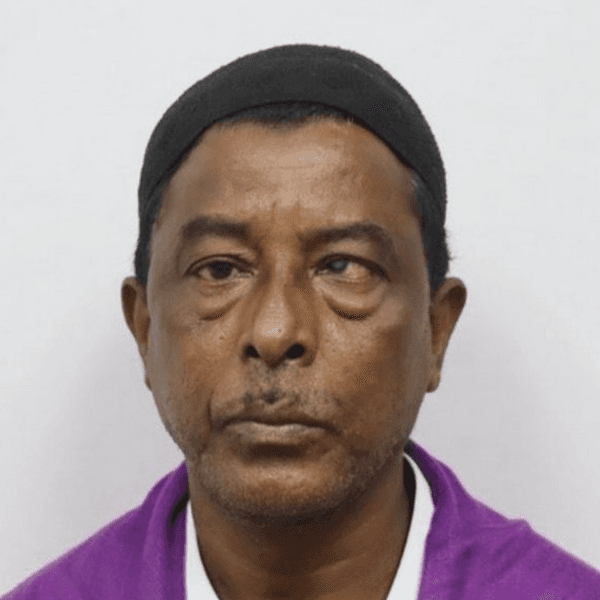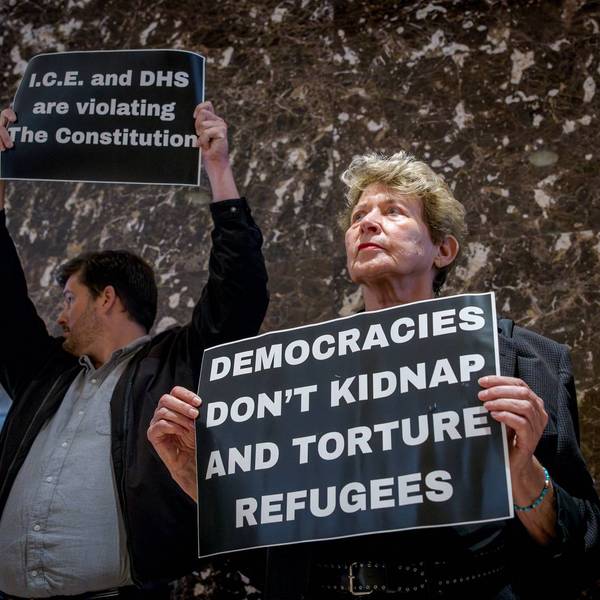Refugees Stranded at Border Sew Mouths Shut to Protest Cruel Treatment
Balkan policies banning refugees based on nationality slammed as 'inhumane'
At least seven people sewed their mouths shut and many more blocked trains on the Greece-Macedonia border Monday to protest the intensifying Balkan crackdown and profiling of refugees and asylum seekers that is impacting those fleeing war and poverty from across the globe.
The demonstrations have been ongoing for at least four days and were organized in response to a recent decision by some Balkan countries to block refugees according to nationality in the wake of the November 13th Paris attacks.
Many of those who have bound their lips together are Iranian nationals on hunger strike for the right to seek asylum and refuge in Europe. They protest alongside numerous others--from Morocco, Pakistan, Bangladesh, and other countries--who are stranded in the Greek village of Idomeni.
Slovenia announced last week it is barring entry to all refugees except those fleeing Syria, Iraq, and Afghanistan--declaring everyone else an "economic migrant" ineligible for admittance. Croatia, Serbia, and Macedonia soon after announced they will follow the same policy.
"I cannot go back. I will be hanged," a 34-year-old Iranian man identified as Hamid told Reuters, explaining he wished to travel to "any free country in the world."
In lively protests that continued through Monday, demonstrators chanted, rallied, and laid down on train tracks, with many from Pakistan holding signs illustrating human rights violations in their home country.
"We are also at war you know?" Yianni, a 34-year-old dentist from Cameroon, told IRIN News last week. "We have Boko Haram! I need to continue with my studies and my life."
The decision has been denounced by refugees, rights campaigners, and global bodies. This includes the International Organization for Migration, the United Nations Refugee Agency, and UNICEF, which released a joint statement on Friday declaring that the profiling of refugees according to nationality "is becoming increasingly untenable from every point of view--humanitarian, legal, and also safety related, not least in light of falling temperatures and the risks for children and others with specific needs."
"These measures by States are creating tension at border crossings and a domino effect, leaving in total limbo some refugees and migrants stranded at different border points," the joint statement continued.
"To classify a whole nation as economic migrants is not a principle recognized in international law," Rados Djurovic, director of the Belgrade-based Asylum Protection Center, told a Serbian state television station. "We risk violating human rights and asylum law."
Rights groups have rebuked European states for erecting fences and sealing off borders in the face of the worst crisis of global displacement since World War II. In a report released last week, Amnesty International argued that such policies do not deter those fleeing war and poverty, but merely force them to take more dangerous voyages, placing them at greater risk of death.
An Urgent Message From Our Co-Founder
Dear Common Dreams reader, The U.S. is on a fast track to authoritarianism like nothing I've ever seen. Meanwhile, corporate news outlets are utterly capitulating to Trump, twisting their coverage to avoid drawing his ire while lining up to stuff cash in his pockets. That's why I believe that Common Dreams is doing the best and most consequential reporting that we've ever done. Our small but mighty team is a progressive reporting powerhouse, covering the news every day that the corporate media never will. Our mission has always been simple: To inform. To inspire. And to ignite change for the common good. Now here's the key piece that I want all our readers to understand: None of this would be possible without your financial support. That's not just some fundraising cliche. It's the absolute and literal truth. We don't accept corporate advertising and never will. We don't have a paywall because we don't think people should be blocked from critical news based on their ability to pay. Everything we do is funded by the donations of readers like you. Will you donate now to help power the nonprofit, independent reporting of Common Dreams? Thank you for being a vital member of our community. Together, we can keep independent journalism alive when it’s needed most. - Craig Brown, Co-founder |
At least seven people sewed their mouths shut and many more blocked trains on the Greece-Macedonia border Monday to protest the intensifying Balkan crackdown and profiling of refugees and asylum seekers that is impacting those fleeing war and poverty from across the globe.
The demonstrations have been ongoing for at least four days and were organized in response to a recent decision by some Balkan countries to block refugees according to nationality in the wake of the November 13th Paris attacks.
Many of those who have bound their lips together are Iranian nationals on hunger strike for the right to seek asylum and refuge in Europe. They protest alongside numerous others--from Morocco, Pakistan, Bangladesh, and other countries--who are stranded in the Greek village of Idomeni.
Slovenia announced last week it is barring entry to all refugees except those fleeing Syria, Iraq, and Afghanistan--declaring everyone else an "economic migrant" ineligible for admittance. Croatia, Serbia, and Macedonia soon after announced they will follow the same policy.
"I cannot go back. I will be hanged," a 34-year-old Iranian man identified as Hamid told Reuters, explaining he wished to travel to "any free country in the world."
In lively protests that continued through Monday, demonstrators chanted, rallied, and laid down on train tracks, with many from Pakistan holding signs illustrating human rights violations in their home country.
"We are also at war you know?" Yianni, a 34-year-old dentist from Cameroon, told IRIN News last week. "We have Boko Haram! I need to continue with my studies and my life."
The decision has been denounced by refugees, rights campaigners, and global bodies. This includes the International Organization for Migration, the United Nations Refugee Agency, and UNICEF, which released a joint statement on Friday declaring that the profiling of refugees according to nationality "is becoming increasingly untenable from every point of view--humanitarian, legal, and also safety related, not least in light of falling temperatures and the risks for children and others with specific needs."
"These measures by States are creating tension at border crossings and a domino effect, leaving in total limbo some refugees and migrants stranded at different border points," the joint statement continued.
"To classify a whole nation as economic migrants is not a principle recognized in international law," Rados Djurovic, director of the Belgrade-based Asylum Protection Center, told a Serbian state television station. "We risk violating human rights and asylum law."
Rights groups have rebuked European states for erecting fences and sealing off borders in the face of the worst crisis of global displacement since World War II. In a report released last week, Amnesty International argued that such policies do not deter those fleeing war and poverty, but merely force them to take more dangerous voyages, placing them at greater risk of death.
At least seven people sewed their mouths shut and many more blocked trains on the Greece-Macedonia border Monday to protest the intensifying Balkan crackdown and profiling of refugees and asylum seekers that is impacting those fleeing war and poverty from across the globe.
The demonstrations have been ongoing for at least four days and were organized in response to a recent decision by some Balkan countries to block refugees according to nationality in the wake of the November 13th Paris attacks.
Many of those who have bound their lips together are Iranian nationals on hunger strike for the right to seek asylum and refuge in Europe. They protest alongside numerous others--from Morocco, Pakistan, Bangladesh, and other countries--who are stranded in the Greek village of Idomeni.
Slovenia announced last week it is barring entry to all refugees except those fleeing Syria, Iraq, and Afghanistan--declaring everyone else an "economic migrant" ineligible for admittance. Croatia, Serbia, and Macedonia soon after announced they will follow the same policy.
"I cannot go back. I will be hanged," a 34-year-old Iranian man identified as Hamid told Reuters, explaining he wished to travel to "any free country in the world."
In lively protests that continued through Monday, demonstrators chanted, rallied, and laid down on train tracks, with many from Pakistan holding signs illustrating human rights violations in their home country.
"We are also at war you know?" Yianni, a 34-year-old dentist from Cameroon, told IRIN News last week. "We have Boko Haram! I need to continue with my studies and my life."
The decision has been denounced by refugees, rights campaigners, and global bodies. This includes the International Organization for Migration, the United Nations Refugee Agency, and UNICEF, which released a joint statement on Friday declaring that the profiling of refugees according to nationality "is becoming increasingly untenable from every point of view--humanitarian, legal, and also safety related, not least in light of falling temperatures and the risks for children and others with specific needs."
"These measures by States are creating tension at border crossings and a domino effect, leaving in total limbo some refugees and migrants stranded at different border points," the joint statement continued.
"To classify a whole nation as economic migrants is not a principle recognized in international law," Rados Djurovic, director of the Belgrade-based Asylum Protection Center, told a Serbian state television station. "We risk violating human rights and asylum law."
Rights groups have rebuked European states for erecting fences and sealing off borders in the face of the worst crisis of global displacement since World War II. In a report released last week, Amnesty International argued that such policies do not deter those fleeing war and poverty, but merely force them to take more dangerous voyages, placing them at greater risk of death.

